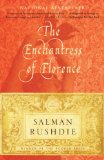Summary | Excerpt | Reviews | Beyond the Book | Read-Alikes | Genres & Themes | Author Bio

Critics' Opinion:
Readers' Opinion:
First Published:
May 2008, 368 pages
Paperback:
Jan 2009, 368 pages
 Book Reviewed by:
Book Reviewed by:
Sarah Sacha Dollacker
Buy This Book
This article relates to The Enchantress of Florence
Salman Rushdie did a tremendous amount of research before writing The Enchantress of Florence, as evidenced by its six-page bibliography. Many of the characters are drawn from history, the most interesting and prominent being Akbar the Great.
As in the book, Akbar the Great was known to be a wise and benevolent ruler. He ruled theMughal Empire (map), founded by his grandfather, from 1556 to 1605, taking the throne at just 13 years of age. He was a fearless leader in war and, by the time he was 15, had succeeded in reuniting Hindustan (most of modern day northern India including parts of Pakistan). He was known for his kindness and religious tolerance. His marriage to Jodhabai was the first royal marriage between a Hindu and an Islamic monarch in India. He abolished laws that prevented commerce between Muslims and Hindus, thereby allowing the economy of his country to prosper.
He was also known for his patronage of the arts, particularly literature. Rushdie's interpretation of Akbar as a man moved and shaped by literature is accurate. He commissioned the Akbarnama ("The Book of Akbar"), a multiple volume work that took seven years to write which tells the story of the life and times of the Mughal Empire during his reign.
He is also remembered for the walled city ofFatehpur Sikri ('town of victory), near Agra, that he ordered built in 1571. Filled with water-filled courtyards and a huge artificial lake, the intended capital city, built in an extraordinarily short time, was inhabited for less than ten years before being abandoned in 1585 when Akbar moved his capital to Lahore (capital of modern-day Pakistan). It is not clear why Fatehpur Sikri was abandoned - possibly it was due to a lack of water or perhaps it was simply that events caused Akbar to have to move his focus to the west of his domain. The former seems the more likely because, fifteen years after moving his capital to Lahore, Akbar returned, but to Agra not Fatephur Sikri, from where he ruled for the remainder of his life.
Just like Rushdie's Akbar, the real-life Akbar was a multi-talented man with an inquiring mind. He required water from the Ganges river be bottled and available to him at all times, calling it "the water of immortality;" was fond of fruits and ate little meat; and is remembered for conducting a language deprivation experiment to prove his theory that speech arises from hearing, in which children were confined at young ages and not allowed to hear human voices. As Akbar had predicted, as the children grew they remained mute.
Filed under People, Eras & Events
![]() This "beyond the book article" relates to The Enchantress of Florence. It originally ran in June 2008 and has been updated for the
January 2009 paperback edition.
Go to magazine.
This "beyond the book article" relates to The Enchantress of Florence. It originally ran in June 2008 and has been updated for the
January 2009 paperback edition.
Go to magazine.





The House on Biscayne Bay
by Chanel Cleeton
As death stalks a gothic mansion in Miami, the lives of two women intertwine as the past and present collide.

The Flower Sisters
by Michelle Collins Anderson
From the new Fannie Flagg of the Ozarks, a richly-woven story of family, forgiveness, and reinvention.

The Funeral Cryer by Wenyan Lu
Debut novelist Wenyan Lu brings us this witty yet profound story about one woman's midlife reawakening in contemporary rural China.
Your guide toexceptional books
BookBrowse seeks out and recommends the best in contemporary fiction and nonfiction—books that not only engage and entertain but also deepen our understanding of ourselves and the world around us.